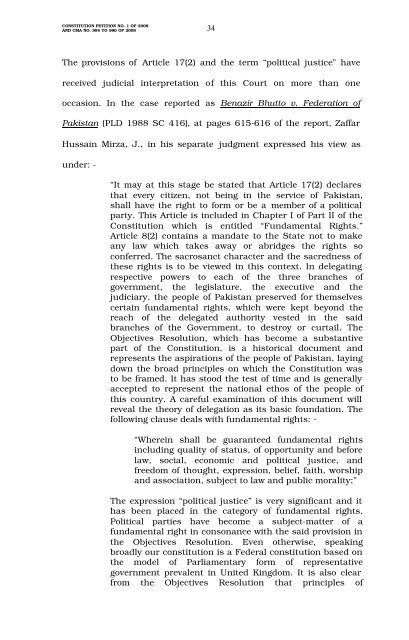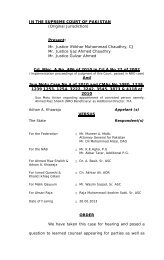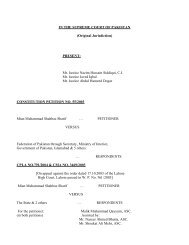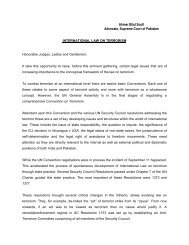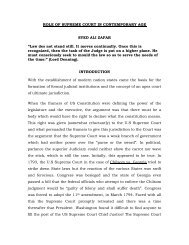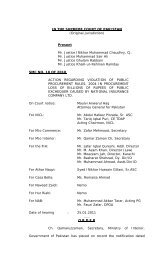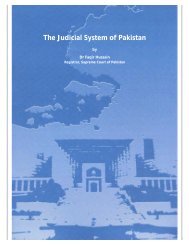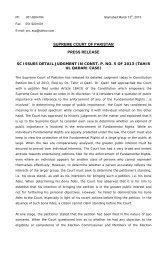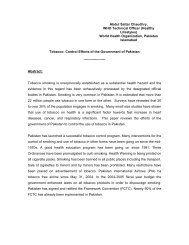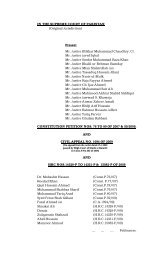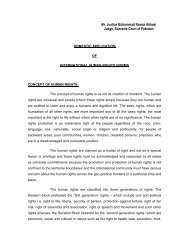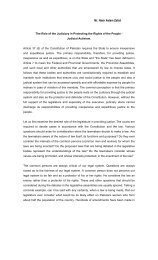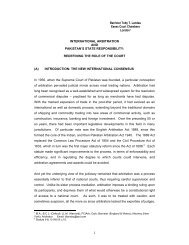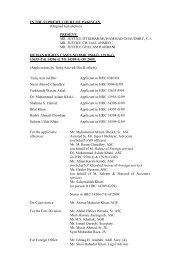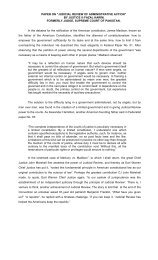MR. JUSTICE ABDUL HAMEED DOGAR, HCJ MR. JUSTICE FAQIR ...
MR. JUSTICE ABDUL HAMEED DOGAR, HCJ MR. JUSTICE FAQIR ...
MR. JUSTICE ABDUL HAMEED DOGAR, HCJ MR. JUSTICE FAQIR ...
Create successful ePaper yourself
Turn your PDF publications into a flip-book with our unique Google optimized e-Paper software.
CONSTITUTION PETITION NO. 1 OF 2008<br />
AND CMA NO. 994 TO 996 OF 2008 34<br />
The provisions of Article 17(2) and the term “political justice” have<br />
received judicial interpretation of this Court on more than one<br />
occasion. In the case reported as Benazir Bhutto v. Federation of<br />
Pakistan (PLD 1988 SC 416), at pages 615-616 of the report, Zaffar<br />
Hussain Mirza, J., in his separate judgment expressed his view as<br />
under: -<br />
“It may at this stage be stated that Article 17(2) declares<br />
that every citizen, not being in the service of Pakistan,<br />
shall have the right to form or be a member of a political<br />
party. This Article is included in Chapter I of Part II of the<br />
Constitution which is entitled “Fundamental Rights.”<br />
Article 8(2) contains a mandate to the State not to make<br />
any law which takes away or abridges the rights so<br />
conferred. The sacrosanct character and the sacredness of<br />
these rights is to be viewed in this context. In delegating<br />
respective powers to each of the three branches of<br />
government, the legislature, the executive and the<br />
judiciary, the people of Pakistan preserved for themselves<br />
certain fundamental rights, which were kept beyond the<br />
reach of the delegated authority vested in the said<br />
branches of the Government, to destroy or curtail. The<br />
Objectives Resolution, which has become a substantive<br />
part of the Constitution, is a historical document and<br />
represents the aspirations of the people of Pakistan, laying<br />
down the broad principles on which the Constitution was<br />
to be framed. It has stood the test of time and is generally<br />
accepted to represent the national ethos of the people of<br />
this country. A careful examination of this document will<br />
reveal the theory of delegation as its basic foundation. The<br />
following clause deals with fundamental rights: -<br />
“Wherein shall be guaranteed fundamental rights<br />
including quality of status, of opportunity and before<br />
law, social, economic and political justice, and<br />
freedom of thought, expression, belief, faith, worship<br />
and association, subject to law and public morality;”<br />
The expression “political justice” is very significant and it<br />
has been placed in the category of fundamental rights.<br />
Political parties have become a subject-matter of a<br />
fundamental right in consonance with the said provision in<br />
the Objectives Resolution. Even otherwise, speaking<br />
broadly our constitution is a Federal constitution based on<br />
the model of Parliamentary form of representative<br />
government prevalent in United Kingdom. It is also clear<br />
from the Objectives Resolution that principles of


